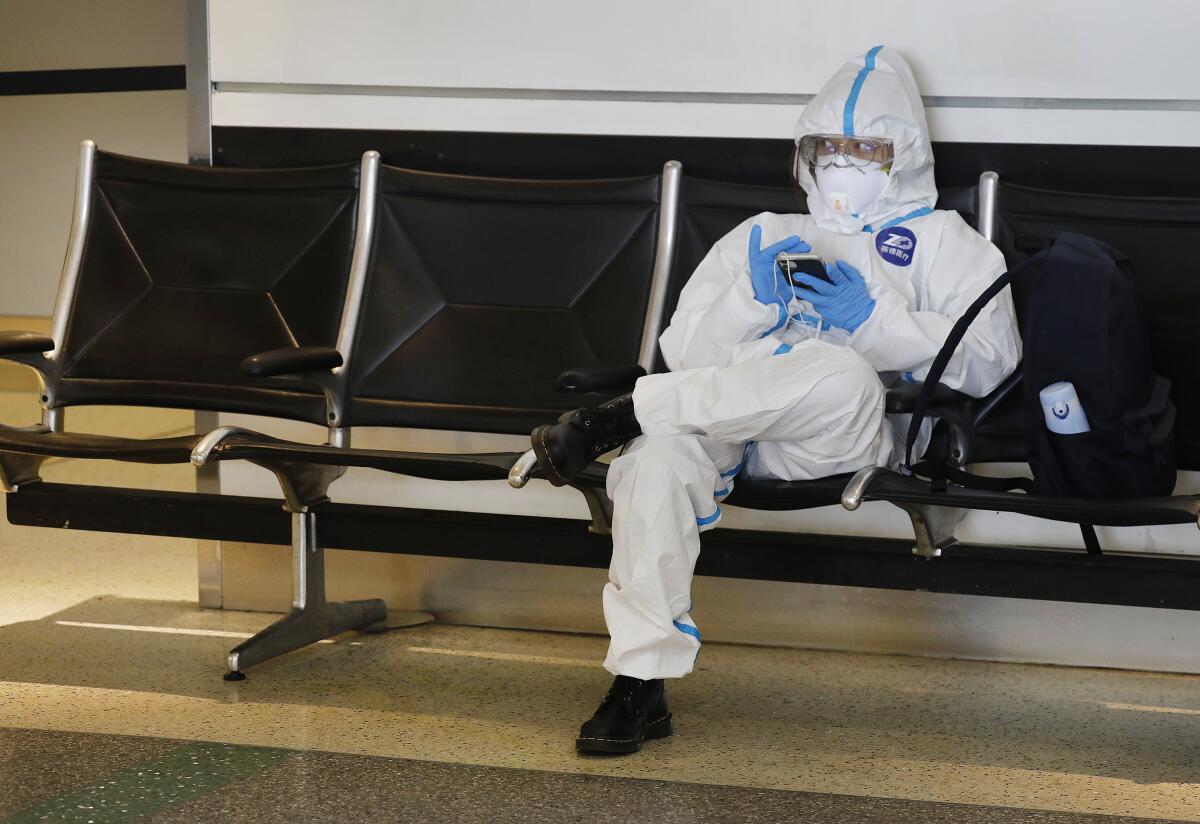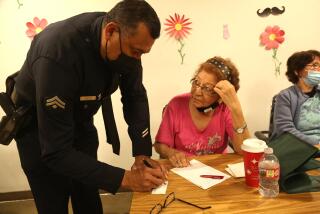With few options to get home, Chinese students abroad fall victim to ticket scams

Nicole Ma just wanted to get home.
The Chinese student’s first year studying abroad at Syracuse University in upstate New York had been upended by the coronavirus. It was the end of March and her dormitory was shuttered, her classes had moved online, and the number of cases in New York was rising by the day. Ma saw no reason to stay.
But she was stuck. Only a small number of flights was being allowed into China and Ma couldn’t get a seat. Four times she bought tickets on well-known travel websites, only to have the flights canceled.
Feeling desperate, Ma turned to some of the more shadowy corners of the internet and quickly found a legitimate-looking company that promised a ticket. She sent nearly $4,000 into the ether. The ticket never came.
Looking back, she feels foolish for being duped. But at the time, “I was too anxious to ask anything,” Ma recalled.
She was not alone. In early April, as the virus had begun its spread around the world after emerging from the Chinese city of Wuhan, more than 85% of the 1.6 million Chinese students who had enrolled at schools overseas in 2020 remained abroad, China’s vice foreign minister said at a news conference. Tens of thousands of them were in California universities, which draw more Chinese students than schools in any other state. Millions more Chinese were working abroad.
Air traffic into China, meanwhile, plummeted in late March when government officials in Beijing imposed tight restrictions that limited Chinese airlines to one international flight each week to a particular country and allowed foreign airlines only one weekly flight into the country. The rules have been eased somewhat in recent weeks, but the country remains largely shut off at a moment when many Chinese living abroad are eager to return home.
Scammers seized on the opportunity. While figures on the number of people swindled are not available, victims of ticket scam have lit up Chinese social media during the pandemic, commiserating online about the loss of money and the reluctance of police in China or elsewhere to investigate cases.
With so many of their students stranded abroad, efforts by Chinese officials to assist them have fallen short. Embassies distributed 500,000 “health kits,” including face masks and sanitizers, and organized online seminars and self-help groups. The government also arranged dozens of charter flights to bring back Chinese citizens in the U.S., including some 7,000 students.
But those who were left to fend for themselves had to navigate a murky online marketplace for airline tickets in which fraudsters mixed with legitimate brokers.
Letitia Wang was among the students who were on their own. Wang, who graduated in the spring from USC’s engineering school, had lined up a job in a laboratory at the school, but decided to return home to Anhui province in eastern China as the virus took hold in the state.
She waded into the same online morass as Ma. One ticket offer was tagged with several comments from people warning they had been scammed by the broker. Another broker offered Wang an economy seat from San Francisco to Shanghai for nearly $11,500.
“I would never find him” if it was another fake, Wang said. “Spending so much money on a flight ticket makes me look rich and stupid.”
Although eager to get home, Wang decided not to risk it. She instead chose to buy a ticket directly from an airline, but it is for a flight in late October, and with China’s flight restrictions there is a good chance it will be canceled.
The experience left Wang sufficiently unnerved that when she learned this week that she had been given a seat on an upcoming charter flight organized by the Chinese Consulate, she didn’t cancel the October reservation. Until she’s on a plane heading home, she’s not taking any chances, she said.
Tiffany Tian, 20, a broker who sells airline tickets at marked-up prices, said the surging demand has left her in a constant scramble to get hold of any tickets to China despite her company’s longtime ties with travel agencies that receive tickets directly from airlines. Tickets, she said, are snatched up within minutes of being released.
And on Weibo, a Chinese social media platform akin to Twitter, and other sites, it is nearly impossible to distinguish scam artists from authentic brokers, Tian said. Scammers often have tens of thousands of followers, accounts verified by Weibo, and a stream of real-looking posts about tickets for actual flights, Tian said.
A friend of Ma’s directed her to a person who worked for an outfit called Victoria Harbour Airlines on the WeChat messaging application. Ma trusted her friend and the person’s online profile appeared legitimate, so she inquired about a ticket from New York to China’s southern city of Guangzhou.
The reply was quick and promising: “I’ll apply for a seat for you and the ticket will be secured within 48 hours. You should pay a deposit now and pay the rest after you get the ticket. If I don’t get the ticket, I’ll return you the deposit.”
Ma sent the hefty down payment, but after a few days of waiting nervously for the ticket to arrive, she decided to look elsewhere. She took a chance on another outfit on WeChat, which came through with a ticket. For weeks, she demanded a refund from the first broker, who strung her along with vague promises that the money would come soon and then stopped responding altogether.
Only when Ma threatened to file a police report did the person resurface.
“What did the police say?” the message asked. “How much do you know? Do you really want to get the money back or are you just causing trouble?”
When another deadline for a refund passed at the end of June, Ma contacted police in Guangzhou. They refused to take the case, telling Ma she should report it to police in the U.S.
“The scammer is in China,” Ma remembers thinking. “How could the U.S. police catch him?”
A few hours’ drive north of Ma, a Chinese student at Toronto University took some consolation in getting police to pay attention.
Before sending the $3,660 demanded by a would-be seller, Zhang, who asked that only his first name be used, checked a popular flight information app to confirm the flight and seats he believed he was booking were real.
Relief, however, quickly turned to suspicion when the ticket didn’t arrive in his inbox.
He called police in both countries. Canadian authorities declined to help, but Chinese police took the case.
“I’m lucky,” he said. “Someone’s investigating my case.”
Ping C. Shen, an attorney in Pasadena who has handled cases for scammed Chinese students, said police in China are much better suited to investigate these types of ticket scams, since the criminals are operating on Chinese-based social media. And while the FBI and other U.S. federal agencies have aggressively targeted pandemic-related scams around the U.S., there is little they can do for people like Ma unless the victim quickly contacts their bank and is able to freeze the transaction, said Laura Eimiller, an FBI spokeswoman in Los Angeles.
“Once money goes overseas, the chances of recovering it are slim to none,” said Eimiller, adding that victims of online scams can file complaints with the FBI electronically.
Frustrated, Ma looked online for help and found that other Chinese students who had been hustled had formed groups on WeChat.
In one of the groups, about 100 students studying in the U.S., Japan, South Korea and elsewhere swapped stories about the different techniques scammers had used on them. Among them, the students had lost more than $285,000, according to three members who asked that their names not be used.
The issue resonated in China. There have been articles about scammed students in mainstream newspapers and for several days it was a trending topic on Weibo, where more than 120 million people viewed a hashtag about it and left thousands of comments.
“Doesn’t anybody care about us?” asked one commenter, who said he had lost about $3,200 while trying to return home from studying in Japan. “Trust no one, they’re all scammers.”
Since returning to China in April, Ma has felt nagging guilt as her parents argued over the money she lost on her fraudulent ticket. Hounding the person who took her money for a refund every day is exhausting.
Ma was surprised when the person returned a few hundred dollars earlier this month. She has little hope she’ll ever see the rest.
It could be worse, she knows. “Many other students haven’t got back to China,” she said. “Their money ... has all been swindled.”
More to Read
Sign up for Essential California
The most important California stories and recommendations in your inbox every morning.
You may occasionally receive promotional content from the Los Angeles Times.














